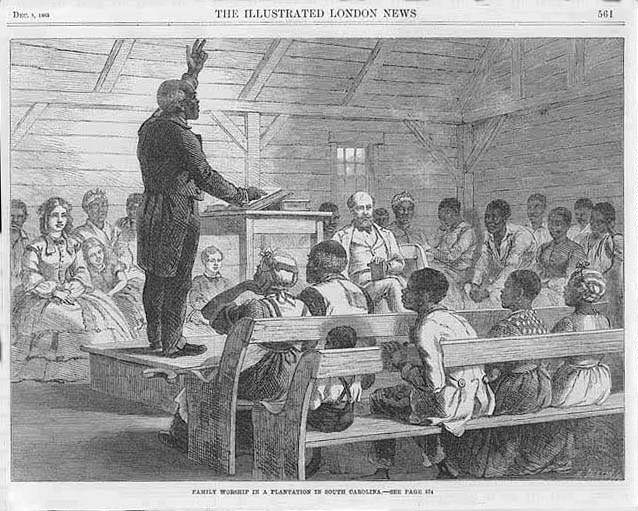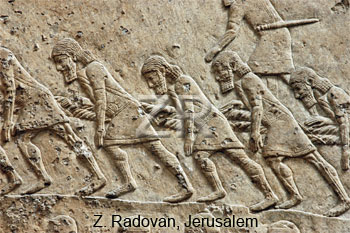12 At once the Spirit sent him out into the wilderness, 13 and he was in the wilderness forty days, being tempted by Satan. He was with the wild animals, and angels attended him.
In verse twelve, the Spirit which has just been, "descending on him like a dove", sends Jesus into the wilderness. The parallelism to the story of Moses and the children of Israel here is obvious. The allusion is reinforced by the forty days, like the forty years Israel spent wandering in the wilderness. The community of Mark sees Jesus as a new Moses. Like Moses, there will be a period of preparation and purification in the desert, the place where the Covenant between God and his people was renewed. Jesus comes to bring a new Covenant and lead his people out of the wilderness and into the Promised Land.
Backing up further in the opening chapter of Mark, even the name of our hero evokes the Exodus story. The Hebrew name of Jesus, Yeshua, is a form of the name Joshua.
Let's look at the rest of the second verse for this post. Jesus spent his forty days in the wilderness being tempted by Satan. Now the Satan of the Tanakh, the Jewish Scriptures, is quite a different figure than that which was created by later Christian mythology. The Hebrew word for Satan means to oppose or accuse. He was envisioned as a member of God's inner council who sometimes played the role of chief prosecutor of Heaven. As seen in the book of Job, he also played the role of tester. In the book of Job he accuses Job of only being righteous because of God's favour and enacts a set of trials which end up proving the righteousness of Job's heart. I can imagine that the community of Mark was saying that Jesus was righteous. He has been tested by God's representative and has emerged pure.
http://www.religioustolerance.org/chr_sat2.htm
The last part of the verse has Jesus with wild animal and attended by angels. This image evokes the Prophets of the Tanakh. Jesus is seen as one with their tradtion as well.
An allusion to the Exodus story can also be seen in the preceding verses with Jesus' baptism. Jewish thought equated the passing of the children of Israel between the waters of the Red Sea as a form of baptism. It was viewed as having been an initiation and purifying ritual for the Hebrews leaving Egypt. Speaking of the children of Israel, Paul in his first letter to the Corinthians in chapter 10, verse 2, says, "They were all baptized into Moses in the cloud and in the sea."
Yeshua (ישוע, with vowel pointing יֵשׁוּעַ –yēšūă‘ in Hebrew) was a common alternative form of the name יְהוֹשֻׁעַ ("Yehoshuah" –Joshua) in later books of the Hebrew Bible and among Jews of the Second Temple period. Meaning "salvation" in Hebrew, it was also the most common form of the name Jesus hence the name corresponds to the Greek spelling Iesous, from which, through the Latin Iesus, comes the English spelling Jesus.[1][2]
https://en.m.wikipedia.org/wiki/Yeshua_(name)
I can imagine that the community of Mark saw this as their own story. They are currently in a wilderness, rejected, marginalized, but Jesus will lead them out of the desert into new life. The fact that they have recast Jesus and themselves in this story begs the question of why? Why is this story so important to them that they tie it so closely to their own faith story in the opening chapter?
The Exodus story is about an oppressed people living as slaves in another's land who were rescued by God and given a land of their own. Did this community feel oppressed and exploited, strangers in a place ruled by those outside of themselves? Consider who this community was made up of. If it was like the early Christian communities talked about in Acts, it was a mixed one of Jew and Gentile, male and female, the poor and marginalized next to those who had been wealthy and connected. That there was a Gentile portion is confirmed by the spelling out Jewish practises as to an audience that would not be familiar to them throughout this Gospel. Many of these would have been those who were discriminated against, oppressed and excluded by Temple Judaism.
Foreigners, women, and the disabled were denied access to the Temple and the presence of God. Likewise the poor, who after being taxed by the Romans, were expected to cough up the Temple tax, were often unable to afford the sacrificial animals which they were required to purchase as Temple approved. As well, they were often unable to afford or have the means to carry out 0the purity practises prescribed by the Law, particularly if they had lost their property to taxes and were homeless.
This use of the Exodus story reminds me of the Negro slaves in the Southern United States. They also in their oppression and exploitation looked to the story of the Exodus as reflective of their own experience and a source of hope.
The book of Exodus, although attributed to Moses, is believed by scholars to be written in the 6th century B.C.E., during the Babylonian Exile. As such, it would have been a subversive story expressing the Hebrews' longing for deliverance from their captivity under the Babylonians, only with the name changed to the Egyptians to allow them to use it more openly. Since there is no concrete archaeological evidence that the Hebrews ever lived in mass as a people in Egypt, (Sorry Republican Presidential Nominee hopeful Ben Carson, there is no evidence that the pyramids were grain elevators built by Pharaoh on the advice of Joseph) we don't know whether there was any historical basis for the story, or whether it was a completely subversive myth of hope.
13 and he was in the wilderness forty days, being tempted by Satan. He was with the wild animals, and angels attended him.
Foreigners, women, and the disabled were denied access to the Temple and the presence of God. Likewise the poor, who after being taxed by the Romans, were expected to cough up the Temple tax, were often unable to afford the sacrificial animals which they were required to purchase as Temple approved. As well, they were often unable to afford or have the means to carry out 0the purity practises prescribed by the Law, particularly if they had lost their property to taxes and were homeless.
This use of the Exodus story reminds me of the Negro slaves in the Southern United States. They also in their oppression and exploitation looked to the story of the Exodus as reflective of their own experience and a source of hope.
The book of Exodus, although attributed to Moses, is believed by scholars to be written in the 6th century B.C.E., during the Babylonian Exile. As such, it would have been a subversive story expressing the Hebrews' longing for deliverance from their captivity under the Babylonians, only with the name changed to the Egyptians to allow them to use it more openly. Since there is no concrete archaeological evidence that the Hebrews ever lived in mass as a people in Egypt, (Sorry Republican Presidential Nominee hopeful Ben Carson, there is no evidence that the pyramids were grain elevators built by Pharaoh on the advice of Joseph) we don't know whether there was any historical basis for the story, or whether it was a completely subversive myth of hope.
13 and he was in the wilderness forty days, being tempted by Satan. He was with the wild animals, and angels attended him.
Let's look at the rest of the second verse for this post. Jesus spent his forty days in the wilderness being tempted by Satan. Now the Satan of the Tanakh, the Jewish Scriptures, is quite a different figure than that which was created by later Christian mythology. The Hebrew word for Satan means to oppose or accuse. He was envisioned as a member of God's inner council who sometimes played the role of chief prosecutor of Heaven. As seen in the book of Job, he also played the role of tester. In the book of Job he accuses Job of only being righteous because of God's favour and enacts a set of trials which end up proving the righteousness of Job's heart. I can imagine that the community of Mark was saying that Jesus was righteous. He has been tested by God's representative and has emerged pure.
http://www.religioustolerance.org/chr_sat2.htm
The last part of the verse has Jesus with wild animal and attended by angels. This image evokes the Prophets of the Tanakh. Jesus is seen as one with their tradtion as well.





No comments:
Post a Comment